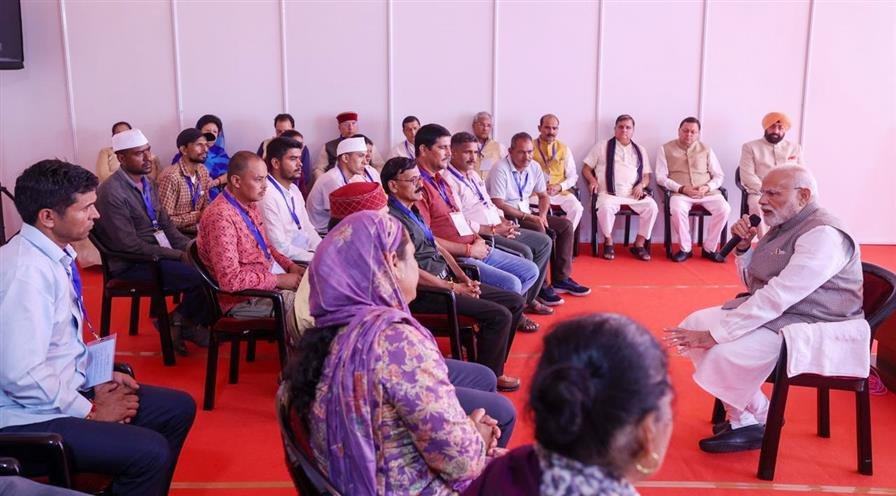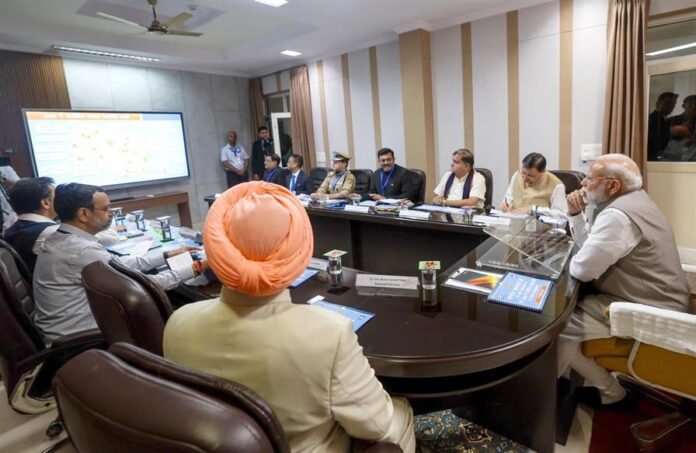Prime Minister Narendra Modi on Thursday announced a financial assistance package of ₹1,200 crore for Uttarakhand, which has been reeling under the impact of devastating rains, floods, and landslides in recent months. The announcement came during his visit to Dehradun, where he reviewed the damage caused by the natural disaster and held a high-level meeting with state officials and disaster management agencies.
The Prime Minister undertook an aerial survey of the worst-affected districts, including areas where swollen rivers and landslides have destroyed homes, roads, and agricultural fields. According to official estimates, over 80 lives have been lost, more than 100 people are missing, and property losses are valued at nearly ₹2,000 crore. The central assistance is aimed at providing immediate relief to victims and supporting long-term reconstruction efforts.
During his address, Modi emphasized that the Centre stands firmly with the people of Uttarakhand in this hour of crisis. “The people of Uttarakhand have shown great courage in the face of this disaster. The Government of India will provide every possible support to restore normalcy and rebuild infrastructure. An amount of ₹1,200 crore has been sanctioned for relief, rehabilitation, and rebuilding works,” he said.
The assistance package will cover emergency relief for affected families, repair and reconstruction of damaged roads, bridges, and public utilities, and support for restoring agricultural and livestock losses. Special focus will also be given to the tourism sector, which has suffered heavily due to the floods and disruption of the Char Dham pilgrimage.

Chief Minister Pushkar Singh Dhami expressed gratitude for the Prime Minister’s swift response and assured that the funds will be used transparently. “We are committed to ensuring that every rupee reaches those in need. The support from the Centre will allow us to accelerate relief operations, rebuild infrastructure, and provide shelter and livelihood to affected families,” Dhami said.
The Prime Minister also highlighted the importance of adopting sustainable development practices in fragile Himalayan regions. He noted that while infrastructure expansion is necessary for connectivity and growth, ecological balance must remain a top priority. “We must learn from this disaster. Roads, bridges, and housing in hill regions must be designed to withstand extreme weather events. Our long-term focus will be on building resilience,” Modi stated.

Relief teams, including the National Disaster Response Force (NDRF) and the State Disaster Response Force (SDRF), continue to operate in affected areas. Helicopters have been deployed to deliver essential supplies to remote villages, while engineers are working to reopen blocked highways.
Experts welcomed the financial package but stressed the need for long-term planning to reduce disaster risks. Environmentalists pointed out that unchecked construction and deforestation have worsened the impact of floods. They urged authorities to enforce strict building norms, improve drainage systems, and invest in early warning technologies.
The ₹1,200 crore aid comes as Uttarakhand prepares for the long road to recovery. For the thousands of families who have lost homes, farmland, or livelihoods, the announcement provides much-needed hope. For the state government, it is both an opportunity and a challenge to rebuild stronger and safer.


























